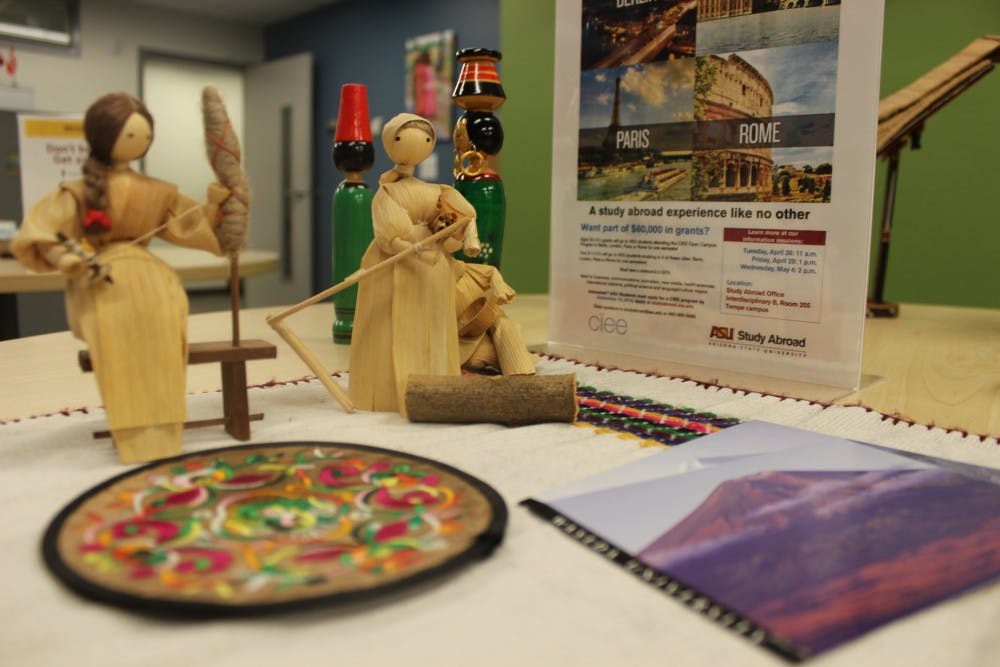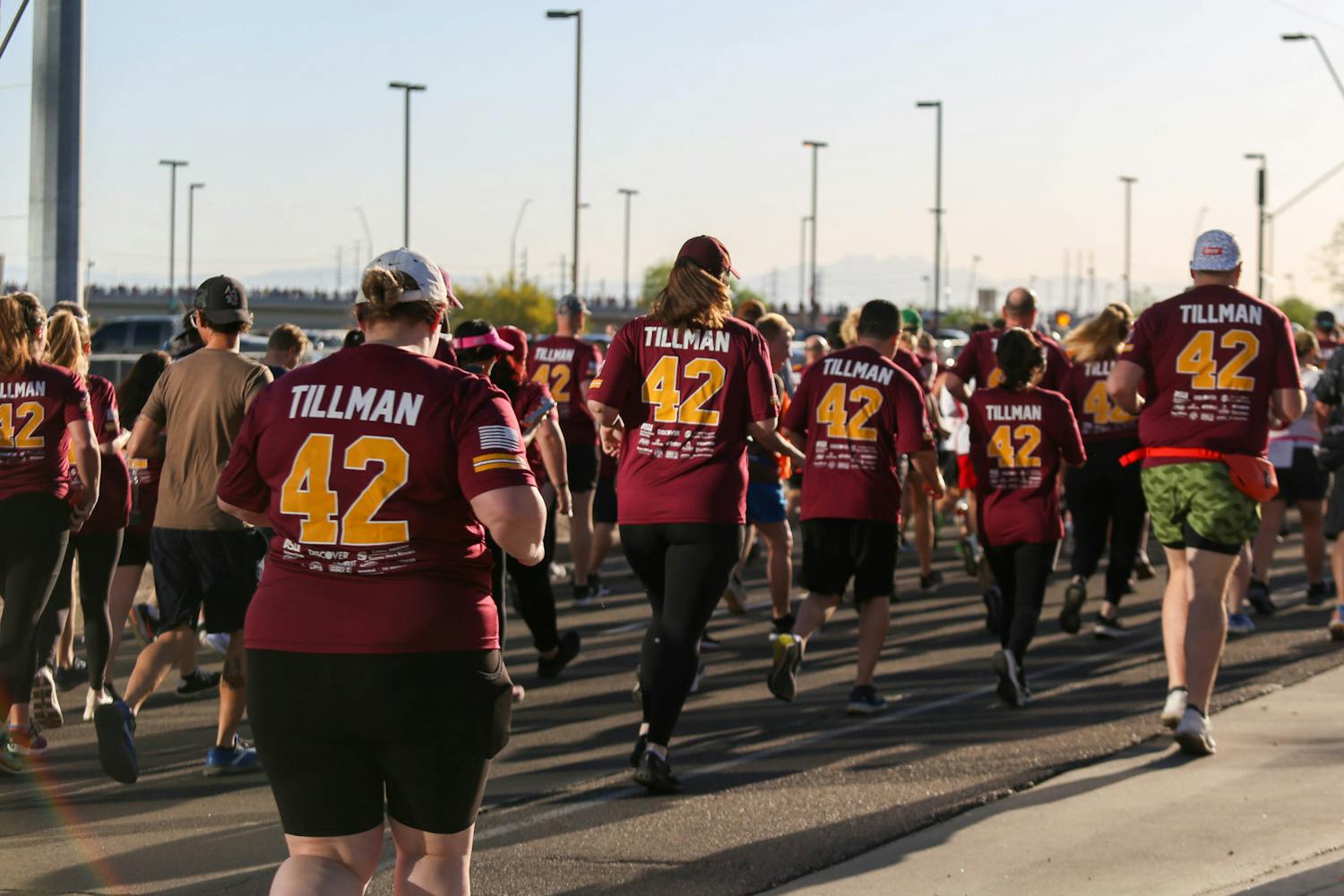Miranda Tomlinson was sitting in the basement of a hostel in Edinburgh playing cards and talking with friends after traveling from London to Scotland for the weekend. Televisions flashed in the background as the group sat laughing and playing at a table.
Simultaneously, everyone’s phones began to go off. Text messages from friends and family back in the states were asking if they were OK. The group turned their attentions to a T.V. and found that Paris had been attacked.
“We stayed up all night reassuring people back home that we were OK and that we were not there,” Tomlinson says.
Students choose to study abroad for a variety of reasons, whether it's to better understand a culture, immerse themselves in a new way of living or to become fluent in a new language. There isn’t a person, however, that chooses to study abroad with the intent of becoming a victim of terrorism.
Tomlinson was just one of the 2,300 Arizona State University students who studied abroad in 2015. With over 250 study abroad programs, ASU sends students all over the world from Belize to Uzbekistan.
The United Kingdom is the most popular destinations for American students who decide to study abroad. England, Spain, Italy and France are ranked as the top countries for students, according to an article from US News.
France has been the target of several terrorist attacks within the past few years. The most recent attacks include the Charlie Hebdo shooting in January 2015, the Paris shooting and bombing in November 2015 and the Nice attack in July 2016. France's neighboring country, Belgium, was also a target this year when suicide bombings took place at Brussels Airport in March.
Fortunately, no ASU study abroad participants were in Nice during the recent attacks.
More than 17,000 students study abroad in France each year according to studyabroad.com. With so many students studying abroad and the risk of terrorism, how is ASU ensuring students stay safe?
Tomlinson traveled to England the fall semester of her junior year to study at the University of Westminster in London. The Walter Cronkite student took a break from sports journalism to enroll in the ISA: Courses with Locals in Multiple Disciplines program.
Tomlinson’s excitement for the trip was trumped by her parents worry. Tomlinson’s parents in Columbus, Ohio, were concerned about the risk of terrorism, pick-pocketing and their daughter’s overall safety.
“Being 2,000 miles away from them (in Arizona) (I thought) what was another 3,000 the opposite way,” Tomlinson says about studying abroad. “There was nothing they could do to save me in Arizona. I think it helped them be OK with it, and me be OK with it, too. I had already been independent for two years before going.”
Before studying abroad, ASU makes it necessary for all students to attend a pre-departure orientation where they are briefed on health and safety when traveling.
“The safety of ASU study abroad students is always our primary concern. Every effort is made to ensure our students, faculty and staff traveling abroad have the resources and information they need for a successful study abroad experience,” the ASU press office says.
Taking weekend or week long excursions when students have a break is common for students who are abroad. Some ASU programs give students the option to take extra trips and the cost is included in their programs.
Even though ASU might be thousands of miles away from its students, Tomlinson says the University asked students to email their faculty director before traveling outside of their study abroad country. If an emergency were to occur, ASU want to be able to locate their students.
No country is off limits when it comes to traveling and ASU says each program is reviewed for safety before the start of the term.
"ASU always monitors events in all of our study abroad locations so that the university can provide assistance at any time," the ASU press office says. "If there is any trepidation about any location, the Study Abroad Office will not allow the program to move forward.
Tomlinson took a trip with students who were in her program to Edinburgh in November and had tickets to travel to Paris two weeks later.
While in Scotland, Tomlinson’s French roommate had traveled home to Paris, the same weekend as the attack. Her roommate came back a little shook and at first told Tomlinson she shouldn’t go to Paris.
Tomlinson and her friend she was traveling with did not cancel their flight but they made sure there was not a ban that would prevent them from entering France.
After learning they were able to go, Tomlinson, her friend and her roommate all agreed they would be safe while traveling.
"We weren't scared at all because we thought of it as being in New York after 9/11. There was no where safer to be," Tomlinson says. "There was military everywhere especially at touristy attractions."
The Eiffel Tower and Notre Dame were the most heavily secured places, Tomlinson says. Lines that she heard typically took hours were short and even though Tomlinson had not been to Paris prior, she noticed a lack of people in the city.
"I have a picture with me and Mona Lisa that has no people in the background, like no one around me. All of my French friends said, 'I've been to The Louvre a million times and I've never gotten a picture like that,'" Tomlinson says.
The summer after studying in London, Tomlinson found out she was going to Rio de Janeiro, Brazil to cover the 2016 Olympics through Cronkite.
The excitement Tomlinson felt during her first study abroad trip had been replaced by fear.
“I had cried myself to sleep for a week before going because I was so torn if I should still go or not,” Tomlinson says.
Tomlinson says watching the news and seeing how the media "blew up" the risks of going to Rio made her scared of going on the trip.
"I thought I was going to see my life in danger a lot," Tomlinson says.
Before heading to Brazil, Tomlinson had to attend another pre-departure orientation — but it was different than the first one. ASU had added a whole segment on terrorism.
The briefing on terrorism was given as "an additional precautionary measure" because of "the unique assignment of being a journalist in Brazil during the Olympics," the ASU press office said.
Although Tomlinson was originally fearful, she felt safer upon arrival than she thought she would.
There were military everywhere she looked, Tomlinson says. It appeared the city was well prepared for anything that could be coming its way.
Tomlinson says most of the group decided not to go to the opening Olympic ceremony because they thought it would be the terrorists first target. After hearing people got back from the ceremony safely, it reassured the group they would be fine.
"There were military everywhere. We walked across this bridge to get to the subway there and there were 60 people just lined up with guns ready for anything. It sounds scary but it just made you feel so safe," Tomlinson says.
The risk of terrorism is not keeping students home. ASU plans for more students to participate in study abroad than last year, the ASU press office says.
Tomlinson says terrorist attacks can happen anywhere at any time and people should not be scared about traveling.
"People who are in the States might feel differently but I think being there and being that close to it and not feeling unsafe at all has not changed any of our passions for traveling and hasn't scared us from going anywhere new," Tomlinson says.




